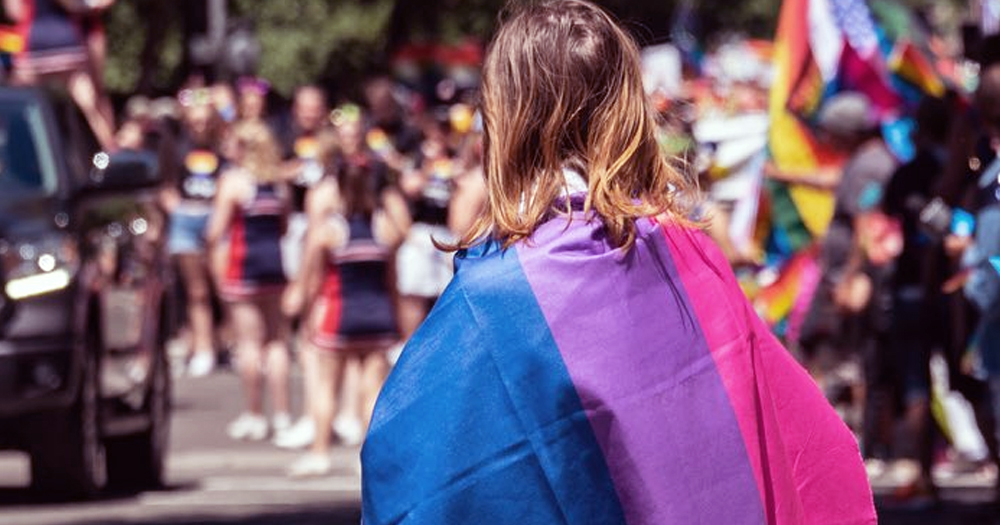On September 23 each year, we mark Bi Visibility Day, an annual celebration conceived as a response to biphobia – the specific prejudice and marginalisation that the bisexual and biromantic community face in our society.
Biphobia is described as the aversion and rejection of bisexuality and bisexual individuals and a form of prejudice that is different from homophobia. In order to understand how biphobia works, we need to consider two factors that come into play:
- heteronormativity, aka the social belief that heterosexuality is the only acceptable form of sexual orientation, which is also responsible for the prejudice and discrimination faced by the wider LGBTQ+ community;
- and monosexism, meaning the belief that sexual orientation only has two fixed categories and that people can either be heterosexual or gay/lesbian.
Because of this second characteristic of biphobia, bisexual people can sometimes also experience discrimination from other members of the LGBTQ+ community. Some forms of biphobic stigma that can usually be detected among the gay and lesbian communities are that bisexual people are privileged because they could ultimately choose to be in a heterosexual relationship and thus not face homophobia; that bisexuality is not a political identity; that bisexual women are reinforcing patriarchy.
https://twitter.com/Zoeygasm/status/1571020063075086337?s=20&t=Xnwp80g3gCyZOBMFCUmohA
This two-way discrimination often causes bisexual people to hide their sexual orientation to a greater extent than their gay and lesbian counterparts. The issue is also linked to one of the main forms that biphobia can take, also known as bi-erasure.
Bi-erasure is the perception that bisexuality as a sexual orientation in itself does not exist and is tied to the common belief that it is only a transitional phase between heterosexuality and homosexuality. In fact, bisexuality is often perceived as a sort of “confusion” regarding sexual orientation, a phase that an individual goes through before fully understanding who they are really attracted to.
These types of prejudices are often also closely linked to gender dynamics. In fact, usually, a bisexual woman is perceived as someone who wants to “experiment” and who is just going through a phase, but is ultimately heterosexual. Conversely, a bisexual man is often told that he is actually gay, but that he is afraid to admit it. These biases show how our way of conceiving sexuality is strongly influenced by the patriarchal system in which we live, which is built around male pleasure and tends to reproduce everything as if we were serving it.
It's #BisexualAwarenessWeek!
Bi-erasure is toxic and has no place in the LGBTQIA+ community.
Love my bi friends. pic.twitter.com/KZFGQsfGr4
— Bohdi ✨?️? (@bohdib_) September 16, 2022
Bi-erasure has also resulted in the general lack of representation of bisexual people in movies, TV series and media in general, as well as the falsification and revision of evidence attesting to the existence of bisexuality in history.
Another common belief, that can be observed even among members of the LGBTQ+ community, is that bisexual people are promiscuous, hypersexual and that they tend to cheat on their partners more easily.
All these biases and misconceptions are often internalised by bisexual people, who end up having to deal with what is called “internalised biphobia”. It leads them to form negative ideas about their sexual identity and to feel inadequate because they believe they are not “queer enough”.
Moreover, bi people are often put under the pressure of somehow having to justify their sexual identity and proving that they are attracted to people of different genders by providing their dating history. However, a bisexual person’s identity is still valid even if they have only always dated people of a single gender, as their partner does not define who they are generally attracted to and sexual orientation does not change once a person enters a relationship.
If you wish to be supportive of your bi friends, try having open discussions with them and listen without assumptions and misconceptions. Check your biases and explore what are the social factors that may lead you to believe that bisexuality is not a legitimate sexual orientation and to have biphobic prejudice.
© 2022 GCN (Gay Community News). All rights reserved.
Support GCN
GCN is a free, vital resource for Ireland’s LGBTQ+ community since 1988.
GCN is a trading name of National LGBT Federation CLG, a registered charity - Charity Number: 20034580.
GCN relies on the generous support of the community and allies to sustain the crucial work that we do. Producing GCN is costly, and, in an industry which has been hugely impacted by rising costs, we need your support to help sustain and grow this vital resource.
Supporting GCN for as little as €1.99 per month will help us continue our work as Ireland’s free, independent LGBTQ+ media.
